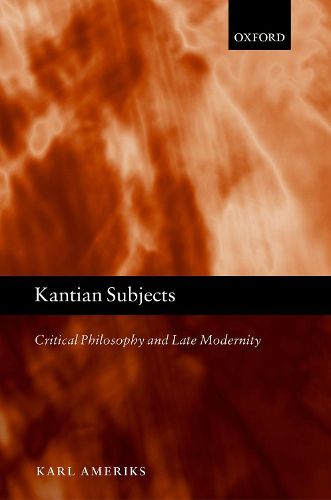Readings Newsletter
Become a Readings Member to make your shopping experience even easier.
Sign in or sign up for free!
You’re not far away from qualifying for FREE standard shipping within Australia
You’ve qualified for FREE standard shipping within Australia
The cart is loading…






In this volume, Karl Ameriks explores ‘Kantian subjects’ in three senses. In Part I, he first clarifies the most distinctive features-such as freedom and autonomy-of Kant’s notion of what it is for us to be a subject. Other chapters then consider related ‘subjects’ that are basic topics in other parts of Kant’s philosophy, such as his notions of necessity and history. Part II examines the ways in which many of us, as ‘late modern,’ have been highly influenced by Kant’s philosophy and its indirect effect on our self-conception through successive generations of post-Kantians, such as Hegel and Schelling, and early Romantic writers such as Hoelderlin, Schlegel, and Novalis, thus making us ‘Kantian subjects’ in a new historical sense. By defending the fundamentals of Kant’s ethics in reaction to some of the latest scholarship in the opening chapters, Ameriks offers an extensive argument that Hoelderlin expresses a valuable philosophical position that is much closer to Kant than has generally been recognized. He also argues that it was necessary for Kant’s position to be supplemented by the new conception, introduced by the post-Kantians, of philosophy as fundamentally historical, and that this conception has had a growing influence on the most interesting strands of Anglophone as well as Continental philosophy.
$9.00 standard shipping within Australia
FREE standard shipping within Australia for orders over $100.00
Express & International shipping calculated at checkout
Stock availability can be subject to change without notice. We recommend calling the shop or contacting our online team to check availability of low stock items. Please see our Shopping Online page for more details.
In this volume, Karl Ameriks explores ‘Kantian subjects’ in three senses. In Part I, he first clarifies the most distinctive features-such as freedom and autonomy-of Kant’s notion of what it is for us to be a subject. Other chapters then consider related ‘subjects’ that are basic topics in other parts of Kant’s philosophy, such as his notions of necessity and history. Part II examines the ways in which many of us, as ‘late modern,’ have been highly influenced by Kant’s philosophy and its indirect effect on our self-conception through successive generations of post-Kantians, such as Hegel and Schelling, and early Romantic writers such as Hoelderlin, Schlegel, and Novalis, thus making us ‘Kantian subjects’ in a new historical sense. By defending the fundamentals of Kant’s ethics in reaction to some of the latest scholarship in the opening chapters, Ameriks offers an extensive argument that Hoelderlin expresses a valuable philosophical position that is much closer to Kant than has generally been recognized. He also argues that it was necessary for Kant’s position to be supplemented by the new conception, introduced by the post-Kantians, of philosophy as fundamentally historical, and that this conception has had a growing influence on the most interesting strands of Anglophone as well as Continental philosophy.